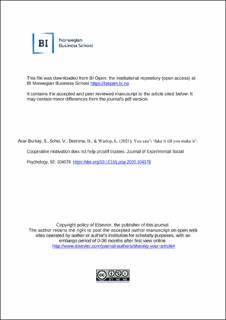You can't ‘fake it till you make it’: Cooperative motivation does not help proself trustees
Journal article, Peer reviewed
Accepted version
Permanent lenke
https://hdl.handle.net/11250/2995479Utgivelsesdato
2021Metadata
Vis full innførselSamlinger
- Scientific articles [2181]
Originalversjon
Journal of Experimental Social Psychology Volume 92, January 2021, 104078 10.1016/j.jesp.2020.104078Sammendrag
Cooperative motivation can be rooted in individual differences as well as in external factors, such as instructions from superiors, incentive schemes, policy agendas, or social relationships. Whereas cooperative motivation has generally been found to increase trust, in five studies conducted across different contexts (scenario-based, online with monetary consequences that were contingent on participants' decisions, in-class and laboratory face-to face negotiations), convergent evidence was found showing that trustees were trusted more when they were externally motivated to act cooperatively (vs. individualistically), though only when they already had a prosocial (vs. proself) social value orientation – i.e., internally driven positive care for others' (vs. their own) well-being. This finding was observed even when trustors had no explicit information about whether or how trustees were motivated by internal or external factors. The mediation analyses indicate that this effect is driven by trustors' perceptions of trustees' authenticity. Taken together, insight into how trustees' personalities and situations interact in predicting the level of trust granted to them is provided.

